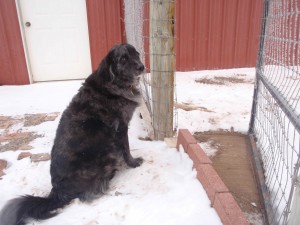
Two nights ago, I informed my husband that I am going to train my dog to guard the chickens. He took it in stride. He only suggested it about 3 years ago. The man has patience.
The problem was that I had read, in what has been a reliable chicken-fact book (Chickens In Your Backyard: A Beginner’s Guide), some anecdotal information about family dogs killing the feathered flock. This corresponded with the rumors I had heard of never leaving a dog alone with chickens. I also hadn’t had as many problems with predators. Then, after the predators, I was thinking of a dog as a potential predator. I have since subscribed to the backyardchickens.com website, which was where I was reading about chicken’s as composting machines, when I came across the idea of using guard dogs to protect chickens. The idea suddenly seemed possible to me. I began to do some research.
The first place I checked was the forum at backyardchickens.com, but was frustrated that it was mostly about what kind of dogs people had or new people asking about the idea. One person offered a link to a yahoo group about LGDs (Livestock Guard Dogs), but I found that to be similar. There may be a wealth of information inside the heads of these experienced people, but wading through the banter was going to drive me nuts!
The one thing I did glean from it all, was that this was common and many people were finding guard dogs useful, and specifically for those bird-brained chickens. It occurred to me to ask a friend in Colorado, who raises various kinds of poultry, if they have guard dogs. An interesting point to that conversation contradicted the axiom that “once a dog kills your birds, it will always do so.” She couldn’t say what made her dogs stop with the occasional killing, but it had stopped. Maybe these things weren’t as written in stone as some resources have said.
My 6 year old stray, that I adopted when she was about 4 months old, looks to me like she is an Australian Shepherd – Golden Retriever mix. She acts like it, too. She has never been prone to chewing, doesn’t like tug-a-war, and herds me with a vengeance when we go for a run. Most importantly, she has been trained using the Koehler dog training methods from an early age. This meant that I felt we could be assured of control if we ventured into the chicken pen. Her name is Kiwi. Do guard dogs have names like “Kiwi?”
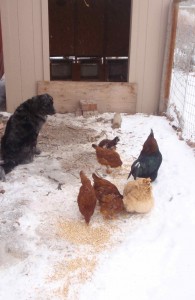
My 16 year old daughter, Carlie, is very involved with both my chickens and my dog (daughter put doggie through an intense review about a year ago, so that daughter could more fully understand the training). We discussed our approach, which would begin with just taking Kiwi out with us whenever we cared for chickens. Plus, we would add a couple of other times during the day to visit the pen. Whatever the result, it was NOT likely to be as bad as the killing rampage of the fox.
Carlie was the first one to take Kiwi into the pen. She kept Kiwi in a heel or a stay that time. The second trip, Kiwi was allowed a short time “at ease” (our relaxed release command that means she may get up). Most of this time was spent sniffing around the pen. Some interest was shown in the chickens, but not a lot. The two older chickens, who have experienced fox attacks, were nervous enough to fly off, which got Kiwi’s attention. She followed, but didn’t chase.
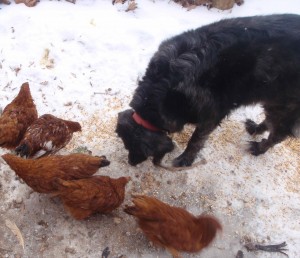
After a couple days of this, I decided to have a turn taking Kiwi out. She was actually telling me it was time to go out. She may not have been remembering it was for the chickens, but she definitely knows what time of day we go out for morning chores. She was ringing her door bell repeatedly, going out by herself, then asking to come right back in, since no one was with her. It’s like an alarm with a zealous snooze control. It’s been 10 seconds and you are still not up!
To be fair to Kiwi, you should know that she sleeps on the floor by my bedside for as long as 12 hours without so much as a peep – until I tell her it is time to get up. Then, she bounces up and is ready for action. This has been the arrangement since she was a fluffy puppy, so I don’t see her spending the night with the chickens, which would obviously be ideal for a guard dog. However, if we get her trained to stay with the chickens much of the day, it might be advantageous to help with training another puppy for the 24/7 guard dog duty. The new dog won’t know the difference, right?
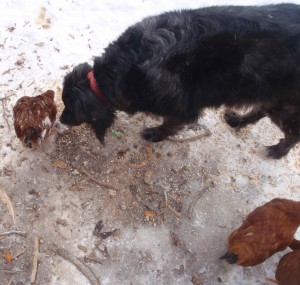
When I took Kiwi in this time, I also kept her in a heel for entry, then a sit-stay for a few moments, to emphasize the idea of calm control. Then, I let her spend quite a few minutes loose. The newer little Rhode Island Reds let her smell them like it was nothing new. They are used to seeing her outside of the pen on a regular basis, for the few weeks they have lived back there. And they have never met a fox. The older chickens at first just casually went back into their coop, but then the 3 year old Buff Orpington came back out to eat. When Kiwi meandered up to her during some sniffing exploration, the hen panicked and caught air to access the coop door. Kiwi made an energetic start to chase, but I immediately called a firm “NO!” and Kiwi stopped in her tracks. Possibly, she was herding it. Her mouth was never open. Very promising exhibition of control.
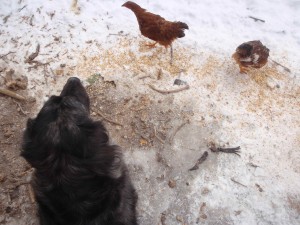
I let Kiwi have a little more time free after that. Carlie made a good point about not ever leaving the coop right after a time of excitement. We want to emphasize the normalcy of being comfortable and quiet in the chicken pen. Kiwi left her scent, which has got to help with some deterrence. When I was ready to leave, I commanded her to heel, which she did promptly. I think she actually enjoys knowing what is expected of her.
I have now ordered a book from amazon.com called Livestock Protection Dogs: Selection, Care and Training based on it’s good reviews. It is fun to see my interest in chickens and the training of my dog come together this way. I’ll keep you posted!
